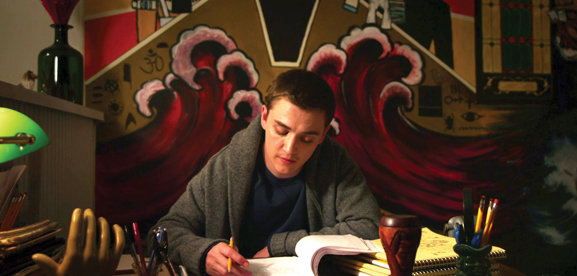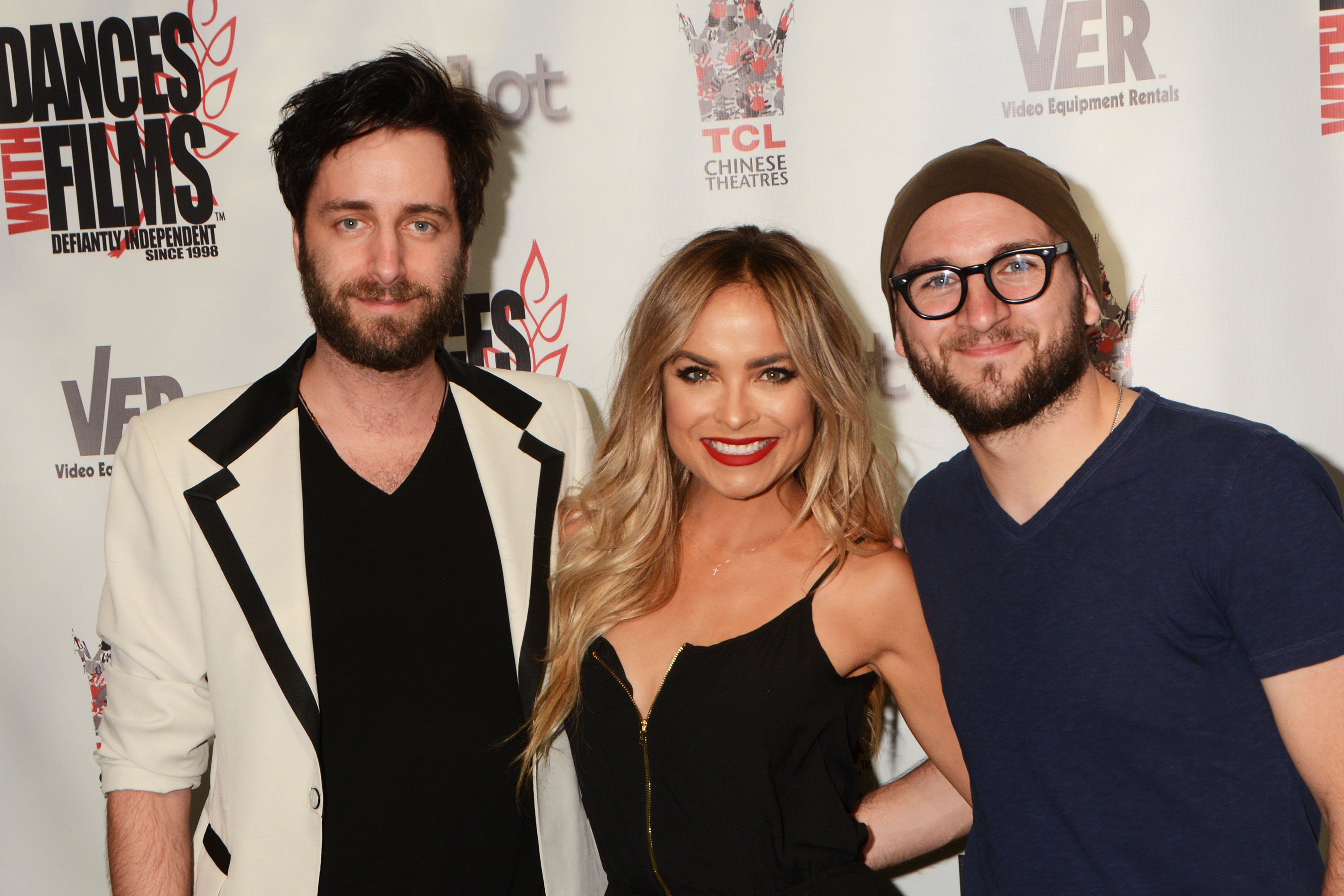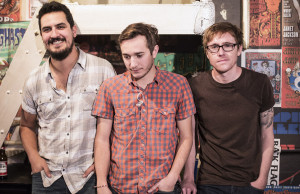Dances With Films: Interview With The Cast And Crew Of ‘Welcome To Happiness’

As a first time writer and director you only get one chance to make a first impression and for many the outcome isn’t pleasant. But director Oliver Thompson managed to make a visually beautiful film with a unique plot in “Welcome to Happiness.”
The film follows Woody, a children’s book writer who is also the gatekeeper to a mysterious door in his apartment that changes the lives of those who enter it.
We were recently given the opportunity to sit down with Thompson and other cast and crew members during the Dances with Films festival in Los Angeles, to see what they had to say about the striking film.

Producer Bay Dariz, actress Chauntal Lewis, and director Oliver Thompson attend the “Welcome to Happiness” premiere in Los Angeles
The film is so visually stunning, the set design and art direction are so beautiful, I really loved it. I heard that Woody’s apartment is actually your apartment?
Oliver Thompson: Yeah, Woody’s apartment is my apartment. The mural idea came to me pretty early on. We needed something visually compelling and I’d just been seeing a lot of murals, and I thought ok this would be cool if this is just something that’s there and becomes part of the story and part of the fabric of the story. He doesn’t even really know the story behind the mural, and then the mural seems to shift and grow and change but I knew how extravagant I wanted it to be, that it would take a while to do. And that was painted primarily by Bay, we designed the whole thing and I was like his painter apprentice, so he would just tell me like paint this whole big chunk blue and then he’d come in and turn it into waves you know, and I guess we knew that would take a long time, so I thought the only way to really realistically do this is to sacrifice my own place. We didn’t have the budget to rent someplace that we could just go work. That would have been ideal, to be able to rent a place and be working on it for three months of pre-production and then go home to a place that’s not a set.
Bay Dariz (producer): It was about 200 hours of painting.
Thompson: Yeah, , and then during the shooting I was sleeping on [Bay’s] futon, at his house, because my house was a hot set, it was not usable, it was not functioning as a home. Once they put all the gear in there you couldn’t even walk. So my house now is fun because clearly the mural is still there. It’s a fantastic hybrid now, it’s Woody’s apartment and mine, we kind of cohabitate. A lot of his stuff is still there because it was sort of just gifted to me after the film.
Paget Brewster (cast – Priscilla): I have a quick question, who was the art director? Was it you guys? Like did you do most of the decisions with the colors and the furniture?
Thompson: Yes I did that. We’ve credited my brother as production designer because my brother is an interior designer by profession, not in movies, in the real world. So what he was able to do for us was he would take my designs, my ideas that were all just sketched and then he put them in a CAD then you have a 3D rendering of the room. But I mean yeah I was the one on Lowes and Home Depots websites looking at wallpaper.
Brendan Sexton III (cast – Nyles): Good. It paid off.
Thompson: My pre-production time was primarily art direction. [Bay] was crazy with the business aspect of things and pulled it together, I can’t do that. I don’t have the brain to do what he did, so I was spending that time working with my bro and being our production designer. And then we had Heidi Koleto as our art and she was very instrumental. Once she came on board it was so great because I could say “Nyles needs to have one of those small mini fridges with faux wood paneling”, then I’m not the one who has to go find that now. Because for the first few months that was me, it was really nice to work with someone else who was just so good at knowing “Oh yeah I know I go here and I know that there’s this auction happening where we’ll be able to get his desk for $7.”
Dariz: I was gonna say, Nyles, his apartment, most of his furniture came from this old woman in San Dimas.
Thompson: Yeah Woody has an awesome little cassette deck, I found that cassette deck on Craigslist and so I drove out to the house and I was like “No actually I want everything that’s in here, this all needs to be in the movie” and she’s like “Well this is a woman who’s now in hospice and we are just auctioning off all her stuff” so Bay and I just drove back out there with the van and got Nyles’ awesome TV, and a bunch of weird 70s stuff for the walls and it was just that kind of thing you know, finding things piece by piece and storing them. It was really fun.
In terms of the storyline what was your main inspiration?
Brewster: He very eloquently earlier said that it grew out of these sort of discussions about the meaning of life at 4 o’clock in the morning, where your brain can kind of go maybe down a rabbit hole.
Thompson: Yeah I mean, I’ve been having those kinds of discussions since I was like 13. My mother is hugely influential for me in talking about those kinds of things, so I come from just a world of people who enjoy talking about “deep things” I guess for lack of a less stupid way to say it, so I think it’s just in me to write something like that. We were trying to make this horror flick that was a little simpler, as a genre film. And ultimately that just wasn’t going anywhere and I sort of had a little inner voice, that sounds so ridiculous to say, but it was just kind of like, “Hey, stop slitting people throats, how about all that stuff that you believe and you have in your heart, say that, Oliver.” And so that’s’ when this idea came to me and it was actually able to turn into a movie, so there might be something to that, I dunno.
In the film I noticed a bunch of pairings, like Woody and Ripley are both orphans, and the Monet book from Ripley’s past shows up in Proctor’s house in that first scene where Nyles is drawing the cat. So with all the different mirroring things, was there an underlying metaphor there?
Thompson: Oh, I don’t know. Woody, Nyles and Ripley are all orphans, I think its just about all these similar connections you know. Bay do you have any thoughts on that?
Dayriz: I think its just sort of that that is such a thing that makes you sort of question everything, and puts that character in a position where they are sort of having trouble moving on in their lives because they sort of missed something or they’re stuck in something, they can’t let go of something. That’s just such a thing that stifles people.
Brewster: What I took from it as an audience member watching the film, if you ask the question “could you change what happened in the past”, that’s the one thing that I would want to change, if I had lost my parents I without hesitation would desire the ability to change that. So I think that was really compelling to me, that it’s not a cut and dried answer and it’s not easy to say “oh everything happens for a reason”, no, there are things that we would respond to deeply, emotionally, if we had the ability to change that.
Yeah I could see that, without your parents I would think that’s where you feel the most lost, because they know you, they know everything about you.
Brewster: They’re responsible for your survival! You’re more dependent on them than anyone.
Thompson: It’s a theme I keep coming back to as I write. The idea of them all being orphans also sort of levels the playing field for all three guys, so like what Bay says, they each have an obstacle so it’s like “ok how is each one of them going to overcome it?” and hopefully they all do, right?
So about the button, when everybody is actually confronted with the button they realize they don’t actually have to push it, but when Woody meets Leah on the street it kind of implies that she did push it? Or do you feel like she did?
Thompson: No I don’t think she did. But what makes you think that?
Just in the way she phrases it.
Thompson: I think she’s just saying, you know you have the option. I think that she’s being a little coy I suppose. She’s not gonna say the whole thing, like this gives you the opportunity to do that, and they’ll talk you through this long winded thing and convince you not to. But it leaves you with the idea, which I’m glad it did. Because [Nyles] asks “Does anyone ever push the button?” and their response is weird. It’s totally ambiguous.
What are you guys working on now? Any upcoming projects?
Thompson: I think we decided today that we’re all going to work together again.
Sexton: Yeah we’re pretty adamant about that.
Brewster: Yeah we’ve been talking to these guys all day about how we want to form an ensemble troupe and keep making movies with Bay and Oliver.
Dariz: Oliver and I have a bunch of projects we’re trying to get out right now. We just finished this one like seven weeks ago so it’s trying to get this thing sold and get the next one going. Paget’s got a new show.
Brewster: I started shooting this show called Grandfather for Fox, that’s gonna start in the fall starring John Stamos and Josh Peck, and then hopefully next hiatus we make another movie.
Thompson: Welcome to Happier-ness



